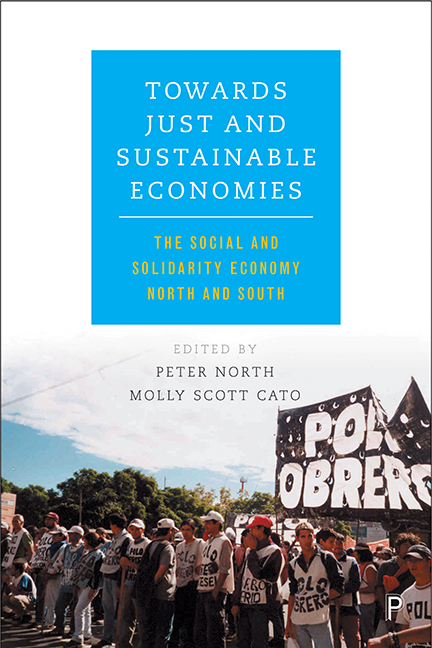Book contents
- Frontmatter
- Dedication
- Contents
- List of figures and tables
- Notes on contributors
- Acknowledgements
- One Introduction: new economies North and South – sharing the transition to a just and sustainable future
- Part I Theoretical perspectives on the social and solidarity economy
- Part II The social and solidarity economy as a site of social innovation
- Part III The social and solidarity economy and the state
- Part IV Policy translation between North and South
- Index
Thirteen - Being a Zapatista wherever you are: reflections on academic-activist practice from Latin America to the UK
Published online by Cambridge University Press: 05 April 2022
- Frontmatter
- Dedication
- Contents
- List of figures and tables
- Notes on contributors
- Acknowledgements
- One Introduction: new economies North and South – sharing the transition to a just and sustainable future
- Part I Theoretical perspectives on the social and solidarity economy
- Part II The social and solidarity economy as a site of social innovation
- Part III The social and solidarity economy and the state
- Part IV Policy translation between North and South
- Index
Summary
Introduction
Consider for a moment your day at work. What tasks do you do, what problems are you working on, what solutions are you generating? Are you supporting, and indeed, expanding, hierarchical, uneven relations that seek to control and dominate, or working towards a world a based on equality, openness and compassion? How would you even know if we were moving in the right direction? What do the thousands of micro-exchanges you engage in add up to? What about huge problems such as climate change, austerity politics, or even those overused behemoths ‘capitalism’ and ‘neoliberalism’? Are you tackling these? Is it your responsibility to? Would you even know how to? Do you regard yourself to be a relatively fair, generous, giving, open person? Do you worry about being better, or don't you care? In sum, what's it all for?
These are some reflections on the thoughts that have passed through my mind during my academic career over the past 20 years, and are reflected both in my own experiences and in the debates in this collection: how do we build economies built on peace, justice and sustainability, and how do we embed this in our everyday practices? These considerations have led me to engage and experiment with a whole range of projects, people and places to try to find some answers and solutions to many of the problems we seem to face as a local and global society.
Early in my academic career just after the millennium, this soul searching took me to Latin America. The Blair government had just come to power in the UK and I felt dissatisfied with Third Way Blairism that had been ushered in (Giddens, 1998). Although it offered some social and economic concessions, it did not feel like a useful response to the problems we faced. We know the many shortcomings of this project and how it has merely extended privatisation and market forces into our lives. So I wanted to engage with social movements that seemed to be providing responses and solutions on the ground. I left academia and, with my partner Tash, went to Mexico to work and live with the communities affiliated with the Ejército Zapatista de Liberación Nacional (EZLN).
- Type
- Chapter
- Information
- Towards Just and Sustainable EconomiesThe Social and Solidarity Economy North and South, pp. 235 - 256Publisher: Bristol University PressPrint publication year: 2017



